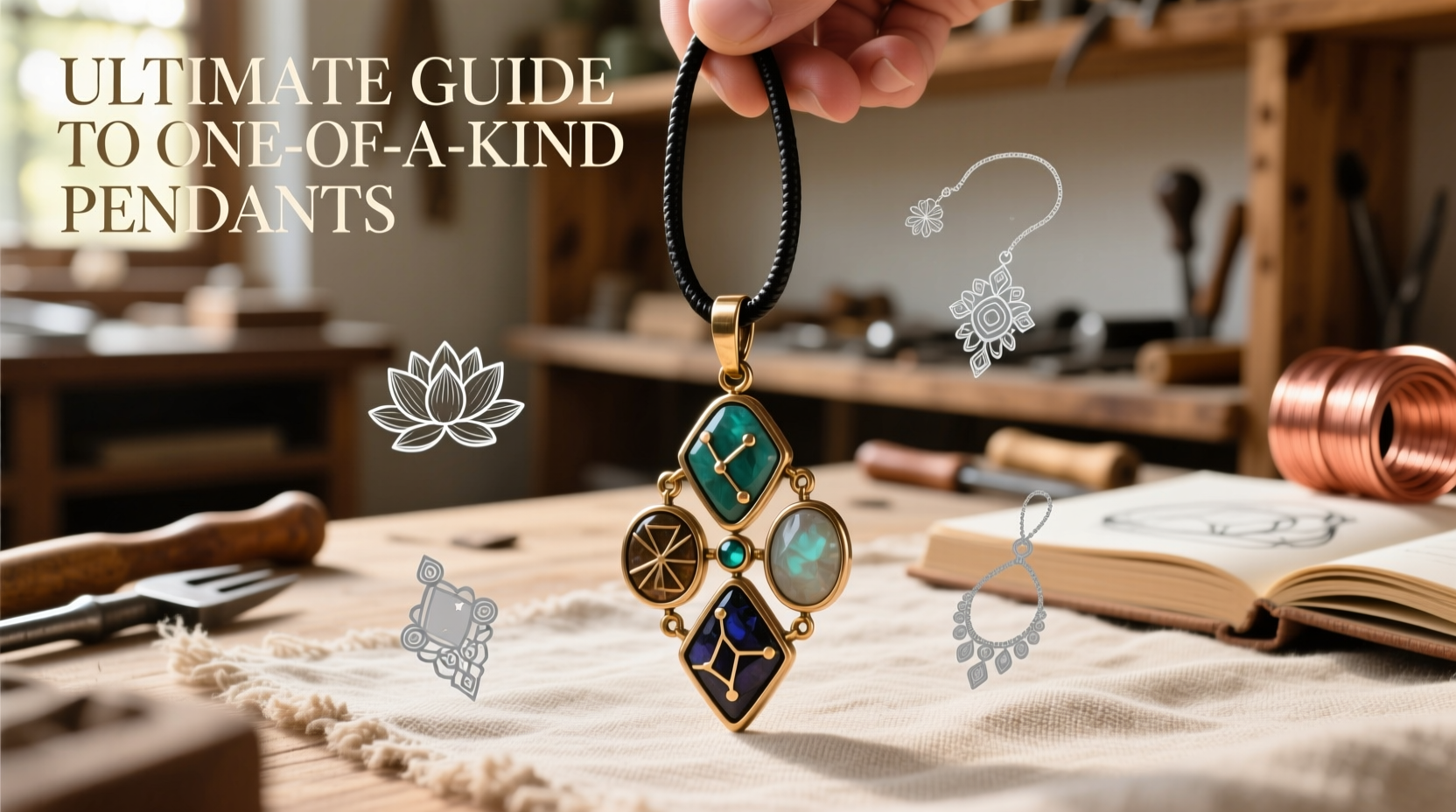A keychain is more than just a functional accessory—it’s a small but powerful extension of personal identity. In recent years, the demand for unique pendant keychains has surged as individuals seek subtle yet meaningful ways to express their style, passions, or memories. Unlike mass-produced options found at chain stores, one-of-a-kind pendant keychains offer exclusivity, craftsmanship, and emotional resonance. Whether you're drawn to vintage charms, hand-carved stones, or custom engravings, sourcing these pieces requires intention and knowledge. This guide walks you through where to look, what to consider, and how to ensure authenticity and lasting value.
Why Unique Pendant Keychains Matter

Personalization in fashion isn’t limited to clothing or jewelry worn on the body. A distinctive pendant keychain can serve as a daily reminder of a milestone, a tribute to someone special, or simply a reflection of your aesthetic taste. Unlike generic metal rings or branded fobs, artisan-crafted pendants carry stories—whether it's a hand-stamped initial, a repurposed antique locket, or a sculpted animal symbolizing your zodiac.
These accessories also make thoughtful gifts. A keychain with a tiny map of a shared travel destination or a charm shaped like a beloved pet conveys sentimentality in a portable format. Because they’re frequently handled, they become tactile touchpoints of memory and identity.
Where to Source One-of-a-Kind Pendant Keychains
Finding truly unique pieces means moving beyond big-box retailers. The best sources emphasize craftsmanship, originality, and ethical production.
1. Artisan Marketplaces
Platforms like Etsy, Ruby Lane, and Chairish host independent creators who specialize in handmade or curated vintage finds. Search terms such as “handmade ceramic keychain” or “vintage locket pendant” yield results filtered by material, origin, and customization options. Many sellers offer personalization services, allowing you to add initials, dates, or symbols.
2. Local Craft Fairs and Pop-Up Markets
Supporting local artisans not only ensures originality but often allows direct conversation about design inspiration and materials. These events are ideal for discovering emerging talent and limited-edition runs. Bring a sketch or idea if you're considering a commission.
3. Antique Stores and Estate Sales
Vintage shops are treasure troves for one-of-a-kind pendants. Look for lockets, signet rings converted into charms, or enamel brooches reimagined as keychains. Always verify metal authenticity with a jeweler if purchasing valuable items.
4. Custom Jewelry Studios
Many jewelers now offer micro-commissions for small accessories. If you have a specific vision—a miniature sculpture of your favorite book cover, a constellation map, or a symbolic animal—you can collaborate with a metalsmith or resin artist to bring it to life.
5. International Artisan Cooperatives
Organizations supporting global craftspeople—such as Ten Thousand Villages or NOVICA—curate ethically made accessories from regions known for traditional techniques. Think Tibetan silverwork, Kenyan bead art, or Mexican alebrijes (fantastical spirit animals).
“Every pendant tells a story. When you wear something handmade, you’re not just accessorizing—you’re carrying intention.” — Lila Nguyen, Sustainable Accessory Designer
Step-by-Step Guide to Finding Your Perfect Pendant
Sourcing a standout piece doesn’t have to be overwhelming. Follow this timeline to streamline your search:
- Define Your Style (Week 1): Gather inspiration via Pinterest, Instagram, or mood boards. Are you minimalist, bohemian, edgy, or nostalgic?
- Set a Budget (Week 1): Handmade or precious metal pendants typically range from $30–$150. Know your limit before browsing.
- Research Sellers (Week 2): Read reviews, examine product photos closely, and check return policies. Prioritize sellers with detailed descriptions and responsive communication.
- Request Customization (Optional, Week 3): If ordering from an artisan, send your concept and confirm turnaround time.
- Evaluate Upon Arrival (Week 4): Inspect craftsmanship, weight, and finish. Does it feel substantial? Is the clasp secure?
- Incorporate Into Rotation (Ongoing): Pair with different keys or leather cords to refresh its look seasonally.
What to Look for in Quality Craftsmanship
Not all handmade items are created equal. Use the following checklist to assess quality before purchasing:
- Smooth edges and consistent finishing (no rough soldering or jagged metal)
- Durable attachment loops or bails that won’t bend under tension
- Authentic material labeling (e.g., “sterling silver,” “natural turquoise”)
- Secure clasps or split rings rated for daily use
- Signs of handcrafting, such as slight asymmetry or tool marks, which indicate uniqueness rather than defect
Do’s and Don’ts When Buying Unique Pendants
| Do’s | Don’ts |
|---|---|
| Ask for a certificate of authenticity if buying gemstones or antiques | Assume “handmade” means high quality without inspecting details |
| Check whether the seller offers repair or refurbishment services | Purchase from accounts with no reviews or portfolio |
| Consider how the pendant pairs with your existing keys and bag hardware | Ignore clasp strength—weak links lead to lost pieces |
| Support artists who disclose sustainable sourcing practices | Overlook shipping insurance for valuable items |
Real Example: Sourcing a Meaningful Gift
Sophie, a graphic designer from Portland, wanted a birthday gift for her sister who had recently moved abroad. She searched Etsy for “custom constellation keychain” and found a jeweler in Quebec who crafted brass pendants laser-cut with star maps based on coordinates and dates. Sophie provided the location of their childhood home and the night they last traveled together. The resulting pendant featured delicate stars connected by fine lines, mounted on a recycled leather strap. Her sister called it “the most personal thing I’ve ever carried.”
This example illustrates how combining emotional intent with skilled craftsmanship produces heirloom-worthy accessories—even at a small scale.
Frequently Asked Questions
How do I verify if a pendant is truly handmade?
Look for variations in texture, minor imperfections, and maker’s marks. Reputable sellers often share behind-the-scenes photos of their process. Also, check shop descriptions for mentions of tools used (e.g., “hand-soldered,” “carved with chisels”).
Can I turn a family heirloom into a keychain pendant?
Yes. Many jewelers offer remounting services, converting old brooches, watch faces, or coins into wearable or utilitarian charms. Ensure the piece is structurally sound and discuss reinforcement options for the bail or loop.
Are resin pendants durable enough for daily use?
High-quality epoxy resin, properly cured and UV-coated, resists cracking and yellowing. Avoid cheap versions exposed to constant sunlight or moisture. For longevity, opt for resin pieces with metal frames or protective bezels.
Final Thoughts: Make Every Detail Intentional
Your keychain doesn’t need to be flashy to be significant. The most memorable designs are those imbued with meaning—crafted by hand, chosen with care, and carried with purpose. As minimalism meets personal storytelling in modern fashion, the humble pendant keychain emerges as a quiet statement of identity.
Start small. Explore one artisan marketplace this week. Sketch an idea that resonates with your journey. Reach out to a craftsperson with a simple question. Each step brings you closer to owning something no one else has—a tiny emblem of who you are, hanging from your keys.









 浙公网安备
33010002000092号
浙公网安备
33010002000092号 浙B2-20120091-4
浙B2-20120091-4
Comments
No comments yet. Why don't you start the discussion?